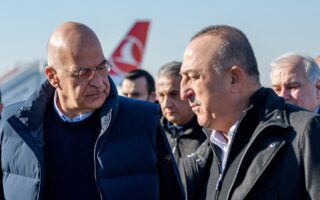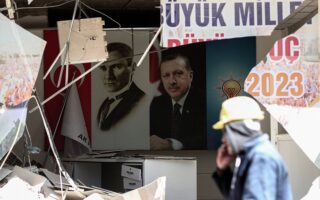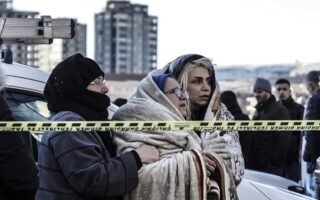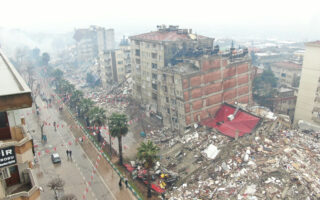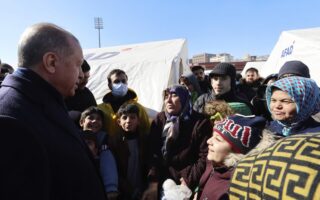Erdogan facing the rack
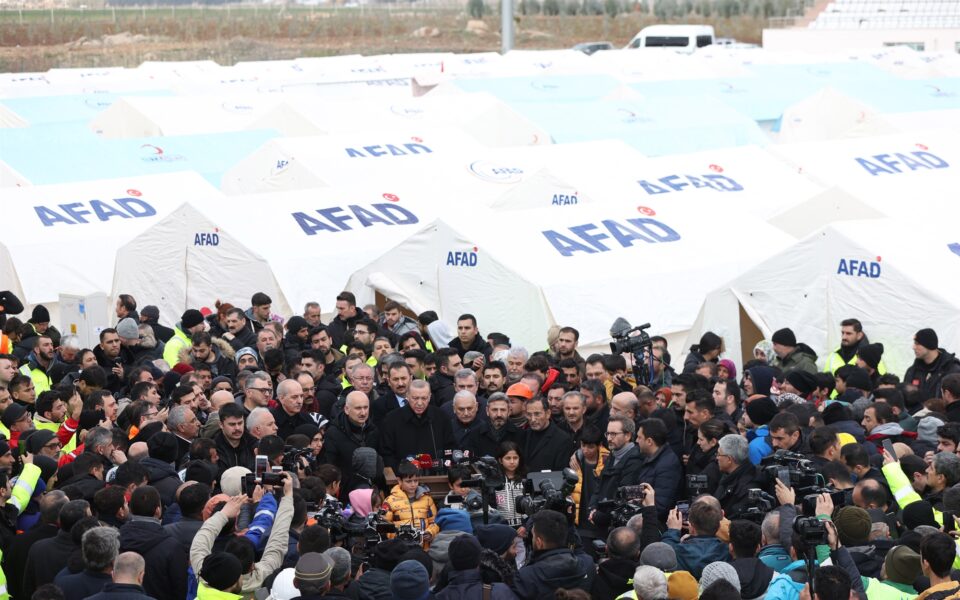
The destructive earthquakes that struck Turkey and Syria primarily have a human dimension. The father who refuses to let go of his dead daughter’s hand, the big sister who protects her younger brother in the rubble, the rescuer who gives water to a trapped child using the cap of a plastic bottle are shocking and torturous images for a mind. However, as we return to cynical reality, we are called on to evaluate the consequences of the earthquakes in the political and diplomatic field.
Two weeks ago, I was part of the Greek delegation to the Greek Turkish Forum, a vehicle for dialogue between Greeks, Turks, Greek Cypriots and Turkish Cypriots, in Ankara. We had the opportunity to meet with, among others, Turkish Foreign Minister Mevlut Cavusoglu, representatives from Turkey’s opposition parties, and Ali Babacan, Erdogan’s former foreign and finance minister and now president of one of the six parties in the opposition coalition.
The opposition cadres expressed excessive optimism, on the verge of euphoria, over the election results. One of the closest advisers of Good Party leader Meral Aksener derisively said that “Erdogan has the privilege of selecting the day of his defeat.” Of course, when he was asked of other similar occasions, that is where an autocratic ruler loses his grasp on power through elections, he did not have an answer. I posed the same question to former Pentagon official Michael Rubin and with difficulty he recalled Chilean dictator Augusto Pinochet (he first lost a plebiscite) and former Yugoslavia’s Slobodan Milosevic (who was ousted in early elections). In any case, up until the earthquakes on February 6, the polls gave the opposition a clear lead in the parliamentary elections, since the six parties together polled at around 45% to 47%, with President Recep Tayyip Erdogan’s party, even though it is in the lead, being hamstrung by the very poor performance (under 6%) of government partner Devlet Bahceli and thus not exceeding 35% to 37%.
The presidential elections are a different issue. According to the schedule, the opposition had been set to announce their candidate, who was likely be Kemal Kilicdaroglu, on February 13. This has been postponed as the country mourns its dead. The same could happen with the scheduled election day, with June 18 being one of the most widely rumored dates, even though Erdogan may try – with great difficulty given that his opponents are already suspicious – to postpone it to a later date, even six months later.
In this battle to the bitter end, the opposition is trying to win the war of impressions and the support of international players, giving hints of structural changes to the Turkish Constitution and by extension the mode of government, from the very centralized and anti-institutional model of the rule of one, to a collective affair, with increased responsibilities for the prime minister (which Erdogan abolished) and parliament. Picking up what US President Joe Biden is laying down, the Turkish opposition is using the same terms to present its struggle against the government as a battle between democracy and autocracy.
In this battle to the bitter end, the opposition is trying to win the war of impressions and the support of international players
During our conversation, there was a charm offensive by the opposition to make their differences from Erdogan’s tactics emphatically clear, even when relating to Greek-Turkish affairs. A member of the opposition with strong connections to Kilicdaroglu characterized the threats leveled against Greece by the Turkish president a violation of the United Nations Charter and promised dialogue instead of frigates and offshore drills. Overall, our interlocutors from the opposition kept their distance from the Turkey-Libya maritime borders and energy deals and some, discreetly, from the “Blue Homeland” doctrine, accusing Erdogan of militarizing foreign policy, considering it responsible for the consolidation of the anti-Turkey front in the region.
Cavusoglu, for his part, insisted on the issue of the militarization of the Greek islands, using a veiled warning tone in case the supply of the islands with equipment continues, even though the prevailing mood in the aftermath of the destructive earthquakes will logically reduce the attacks on Greece for some time.
Erdogan is in a very difficult position and in great need of external financial aid to quickly heal the wounds caused by the disaster, with his loss of control a visible risk despite the imposition of a state of emergency for three months in 10 provinces to maintain the initiative. Of course, this damages the image of a strong leader of a powerful country which supposedly manages on its own and has a strong standing. However, right now, he is concerned with reversing his negative image domestically and to this end he should revise, even temporarily, tactics and strategic aspects of his foreign policy.
Irrespective of the large scale of the earthquakes, he will find himself apologizing for errors in urban planning and the obvious weaknesses of a corrupt, one-man model of governance, while at the same time having to efficiently and rapidly confront the volatile problems of providing healthcare, housing, unemployment and reconstruction, and ultimately the displeasure, if not anger, of his compatriots. And this in regions that the governing party is popular and where almost 15% of the total population of the country resides. This tragedy has the potential of placing Erdogan on the rack, with known results.
Constantinos Filis is the director of the Institute of Global Affairs and an associate professor at the American College of Greece.
